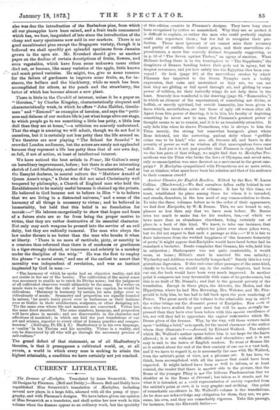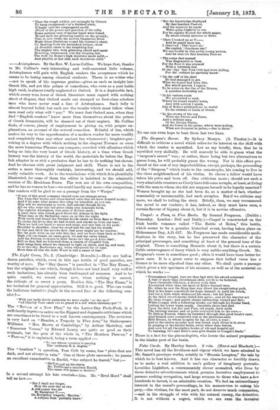Ancient Classics for English Readers. Edited by the Rev. W.
Lucas (Blackwood.)—We find ourselves fallen sadly behind in our notice of this excellent series of volumes. It has by this time, we trust, established its place among those for whom it is intended, and stands, therefore, in the less need of any commendation to them. To take the three volumes before us in the order of their appearance, we find first Euripides, by W. B. Donne. This, we are bound to say, pleases us less than any that we have seen before. Mr. Donne tries too much to make fan for his readers, fun,—of which we have more than an abundance elsewhere, being certainly out of place in a book of this kind. We know, to take one instance, that matrimony has been a stock subject for jokes ever since jokes were, but we did not expect to find such a passage as this :—" If it is fair to draw inferences from the wedded happiness of the laureate fraternity of poets,' it might appear that Euripides would have fared better had he remained a bachelor. Dante complains that Gemma, his wife, held him in subjection ; Shakespeare was not quite comfortable, it would seem, at home ; Milton's start in married life was unlucky ; Wycherley and Addison were fearfully henpecked." Surely this is a very gratuitous digression. If this and some other passages of the same kind, chiefly to be found, we should say, in the earlier chapters, had been cut out, the book would have been very much improved. In another , point it compares not very favourably with some of its predecessors, but this is no fault of Mr. Donne's ; and that is the general poverty of the translation. Except in three plays, the Alcestis, the Medea, and the Hippolytus, where he had Mrs. Browning, Mrs. Webster, and Mr. Fitz- gerald to help him, he has had to fall back upon the poor rendering of Potter. The great merit of the volume is the admirable way in whi.1 the writer brings out the dramatic power of Euripides. Few p.en of those who have studied the poet most but will be more aseonfflY im- pressed than they have ever been before with this speoi41 excellence of his, nor will they fail to appreciate the capital summaries which Mr. Donne gives of the dramas. Why, by the way, will these writers insist upon "holding a brief," so to speak, for the moral character of the author whom they illustrate ?--..Tuvertal, by Edward Walford. The subject which Mr. Walford's author opens before him is too large for the limits allowed ; it is not without difficulties and obscurities; and it Is not easy to suit to the tastes of English readers. To treat of Roman life as it existed about the end of the first century of our era is a vast task, and if we have to regard it, as is necessarily the case with Mr- Walford, from the satirist's point of view, not a pleasant one. It has here, we think, been accomplished with all the snoop.% that could have been expected. It might indeed have been a, well to inform, or at least remind, the reader that there is anotaer side to the picture, that the Rome of the younger Pliny is nos the hideous Pandemonium that we shudder at in the Rome of Juvenal; but taken as it stands, and for what it is intended, as a vivid representation of society regarded from the satirist's point of view, it is very graphic and striking. One point of remarkable excellence in Mr. Walford's volume is the translations. As he does not acknowledge any obligation for them, they are, we pre- sume, his own, and they are remarkably vigorous. Take this passage, for instance, from the Eleventh Satire :— "Then the rough soldier, yet untaught by Greece To hang enraptured o'er a finished piece, It haply 'mid the congregated spoils (Proof of his power and guerdon of his toils) Some antique vase of master band were found. Would dail the glittering bauble on the ground; That in new forms the molten fragments drest Might blaze illustrious round his courser'a cheat, Or. flashing from his burnished helmet, show (A dreadful omen to the trembling foe) The mighty sire, with glittering shield and spear Hovering, enamoured, o'er the sleeping fair, The wolf, by Rome's high destinies made mild.— And playful, at her side, each wondrous child."
—Aristophanes. By the Rev. W. Lucas Coffins. We hope that thanks to Mr. Collins's very interesting and well-executed little volume, Aristophanes will gain with English readers the acceptance which he seems to be losing among classical students. There is no writer who —not to speak of his supreme genius—gives us such an insight into Greek life, and yet this prince of comedians, who even as a poet holds high rank, is almost totally neglected at Oxford. It is a deplorable fact, which every true lover of Greek literature must regard with nothing short of disgast, that Oxford sends out stamped as first-class scholars men who have never read a line of Aristophanes. Such folly is almost beyond belief, but such are the results which must follow when men read only what will "pay." We trust that Oxford men, when they find "English readers" know more than themselves about the prince of Greek dramatists, will be shamed out of their neglect. Mr. Collins finds, of course, plenty of employment in giving us, with proper ex- planations, an account of the several comedies. Brimful of fan, which makes its way to the apprehension of a modern reader far more readily and completely than any other ancient fun whatsoever ; laughter-pro- voking in a degree with which nothing in the elegant Terence or even the more humorous Plautus can compare ; crowded with allusions which bring us into the very heart of Greek history, at a time when Greek history was the history of the world, the materials lie before the Eng- lish adapter in so rich a profusion that he has to do nothing but choose. And he chooses with great judgment and skill. There is not in the series a more thoroughly readable, interesting, and we should add, really valuable work. As to the translations with which it is plentifully illustrated, for some of them the editor is indebted to the admirable version of Mr. Hookham Frere. The rest are of his own composition, and he has no reason to fear—we could hardly say more—the comparison. Our readers will be glad to see a passage from the "Wasps."
"If any of this good company should note our -strange array,
The wasp-like waists and cross-barred snits that we have donned to-day; And it he asks what means this sting we brandish, as you see, Him will we undertake to teach, dull scholar though he be, All we who wear this tail-piece claim true Athenian birth, The rightful Aborigines, true eons of Mother earth ; A lusty race, who struck good blows for Athens in the fight, What time as the Barbarian came on us like the night. With torch and brand the Persian horde swept on from East to West, To storm the hives that we had stored, and smoke us from our nest: Then we laid our hand to spear and targe, and met him on his path; Shoulder to shoulder, close we stood and bit our lips for wrath, So fast and thick the arrows flew, that none might see the heaven ; But the gods were on our side that day, and we bore them back at even, High o'er our heads, an omen good, we saw the owlet wheel, And the Persian trowsers in their backs felt the good Attics steel ;
Still as they fled we followed close, a swarm of vengeful foes, And stung them where we chanced to light on cheek, and lip, and nose,
So to this day, Barbarians say, when whispered far or near,
More than all else the Attic WASP is still a name of fear."



































 Previous page
Previous page